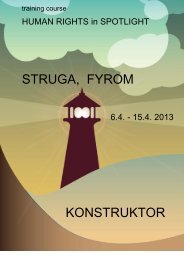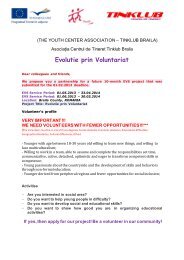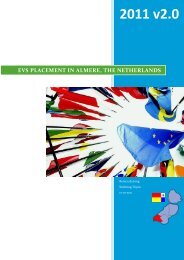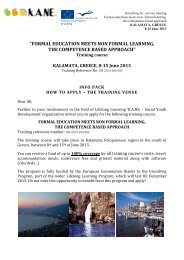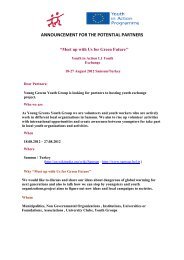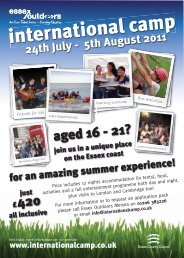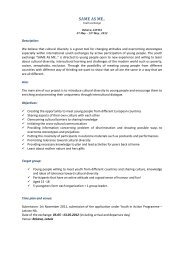newsletter november 2012.pdf - Youth Networks
newsletter november 2012.pdf - Youth Networks
newsletter november 2012.pdf - Youth Networks
You also want an ePaper? Increase the reach of your titles
YUMPU automatically turns print PDFs into web optimized ePapers that Google loves.
– Newsletter November 2012 -<br />
”DNS Tvind”<br />
The Necessary<br />
Teacher Training College<br />
www.dns-tvind.dk<br />
News from the DNS<br />
teams, this time from<br />
Morocco,<br />
Mozambique,<br />
Denmark & Palestine<br />
1
– Newsletter November 2012 -<br />
WHAT IS NEW IN NOVEMBER?<br />
Photo report: DNS 2012 in Morocco<br />
Our first year students send best greetings from Africa—in particular<br />
from Morocco. They had good investigation periods<br />
where they lived with families, experienced Moroccan village<br />
life, fixed their busses here and there, enjoyed Moroccan tea and<br />
cuisine, dig deep into different political, social and economical<br />
questions of Morocco and took care of their second home—the<br />
bus. Read more<br />
My job is more than only work, by Darja<br />
For sure, my job is more than only work. My job – is my life<br />
now. I spend 24/7 at my working place, with colleagues, with<br />
students. We share our daily routine, responsibilities, plans,<br />
and with a time – memories. Now those people are the most<br />
important part of my life – present. Read more<br />
Manual for beginner teachers, by Marina<br />
Travel for one month, by bus, from Denmark to Turkey, with<br />
a group of eight students.<br />
This was the proposal that I couldn’t reject and to be honest I<br />
just had the same words spinning in my mind, “It will be awesome!”<br />
Read more<br />
www.dns-tvind.dk<br />
Moroccan village investigation, by Uldis<br />
I spent four days with my team-mate Egle in a Moroccan<br />
mountain village. On a sunny day around four in<br />
the afternoon we were dropped out of (maybe just off)<br />
our bus by our teacher in Morocco mountain area.<br />
Teacher pointed up the mountains: "Those houses, it<br />
looks like there is a village. If someone will take you<br />
there then it is fine. If not," he pointed down the mountain,<br />
"try your luck there." Read more<br />
Visiting the museum in Maputo, by Ruta<br />
8th of October is a teacher's day in Mozambique. Usually<br />
it is a holiday for the teachers and students, but since<br />
our students and teachers are living together on the campus,<br />
I and Gita have decided to bring the students to the<br />
museum in Maputo. Read more<br />
Palestine: it is not a conflict, it is an occupation,<br />
by Natalya<br />
During my „Do what you find most appropriate to do”<br />
period I had a chance to go to Palestine myself for the 1 st<br />
time. Moreover I could organize a study trip for 4 students<br />
from PTG (Practical-Theoretic Basic Education)<br />
and make a project with our friend’s organization in the<br />
refugee camp. Well, it sounded like a really right thing<br />
for me to do. Read more<br />
2
– Newsletter November 2012 -<br />
DNS 2012 is already in Morocco<br />
Our first year students send best greetings from Africa—in particular from Morocco. They had good investigation<br />
periods where they lived with families, experienced Moroccan village life, fixed their busses here and<br />
there, enjoyed Moroccan tea and cuisine, dig deep into different political, social and economical questions of<br />
Morocco and took care of their second home—the bus. Hereby you can enjoy some pictures from their first<br />
month, already reaching Morocco, but on the way towards Mauritania, Senegal and Guinea Bissau.<br />
Follow DNS 2012 on our Official DNS Facebook page: http://www.facebook.com/PromotionTvind<br />
www.dns-tvind.dk<br />
3
– Newsletter November 2012 -<br />
My job is more than only work, by Darja DNS 2013<br />
For sure, my job is more than only work. My job – is my life<br />
now. I spend 24/7 at my working place, with colleagues,<br />
with students. We share our daily routine, responsibilities,<br />
plans, and with a time – memories. Now those people are<br />
the most important part of my life – present.<br />
About one month ago I started to work in Bustrup School<br />
Center (1 hour away from the DNS college). The main thing<br />
about this place – it is a school, one of those small boarding<br />
schools. They have around 19 students, who are ”troubled<br />
kids”, but not the most hard case. Every one of them have<br />
their own study program, but from the first view, and most<br />
of the time, they are just simple teenagers. Ages vary from 12<br />
-18, so probably I am looking like one of the students here.<br />
Their program consists of a lot of practical stuff.<br />
Bustrup has a fitness center, a small gallery and we just<br />
started to run a shop with<br />
things from China (not classic<br />
ones, as I thought before, but<br />
modern ones) – there are<br />
cups, pillows, sofas, clocks,<br />
teapots, vases etc.<br />
As I heard when I was coming<br />
here – the main purpose<br />
of my job is that shop. All the<br />
pedagogues are doing their<br />
jobs, and there is not much<br />
time or energy left for something<br />
else. As I don't know<br />
Danish yet, and I cannot<br />
work with students, I should<br />
just help somewhere around<br />
that shop, the gallery and the<br />
fitness center.<br />
But all along and as time goes, I am working with students.<br />
Bustrup is housing two care homes – one is in the same<br />
building as the school is, just upstairs, and here a few students<br />
and some teachers and pedagogues live. The other<br />
care home is a house ten minutes walk from the main building<br />
– it is on the top of a hill, and has a nice view to the fjord<br />
– that's why it is called Udsigten (view). Four guys 14-18<br />
years old live there + one is coming only on weekends and<br />
he is 20 already. One or two pedagogues are always in the<br />
house. There are around six pedagogues and they are changing<br />
all week long, spending 1-1,5 in the house. When they<br />
are changing all the time, it is hard to look after the house.<br />
They have to cook, to take kids everywhere, solve some<br />
problems, so the house is not vacuum cleaned for few weeks<br />
sometimes.<br />
www.dns-tvind.dk<br />
When I came<br />
here I had no particularresponsibilities<br />
at all. On<br />
one hand – it was<br />
nice, because I<br />
could do whatever<br />
I like, and it<br />
w o u l d b e<br />
counted as a<br />
work. So, first<br />
weeks I was helping to cook and joined art room activities,<br />
yoga lessons, joined some programme for students, was helping<br />
to clean, was spending some time with students, feeding<br />
horses, helping to prepare for the trip and a lot of other<br />
things. On the other hand – all the day long I was doing<br />
something, as wanted to be useful on my job, and I still<br />
couldn't be sure that it was enough that day, because being<br />
everywhere – is the same as being nowhere. So, I am happy<br />
now to receive some everyday responsibilities.<br />
Every day I am waking up with everybody in the house, and<br />
we are going to the school, where they are doing studies, and<br />
I am going to do some tasks in the shop (there still are a lot of<br />
work of making it nice, advertising, and comfortable). Also I<br />
am still joining pedagogues group – next week helping with<br />
TCE and preparation of presentation for the annual school<br />
event. I am quite good with one autistic student, so now we<br />
will go to the gym every day. Also we found a good way of<br />
making me learn Danish and in the same way get along with<br />
housemates – now I have lessons of Danish with one of them.<br />
But there are thousands of other tasks – as I am a person,<br />
who always can help.<br />
I am developing “from inside”. If you don't have energy,<br />
then you cannot do anything properly, and it is hard to find<br />
balance between expressing yourself too much/ not enough,<br />
overworking, working not enough, moving forward, or not.<br />
Sometimes I am losing myself in thoughts and it takes time to<br />
get back into a good and proper self feeling. But I am working<br />
on it everyday.<br />
There are a lot of cases, where you cannot do anything, because<br />
some decisions are already done in the past. That's<br />
why self control, self- development, “not sleeping” all the<br />
time – is important. Because every single decision made influences<br />
our future.<br />
So, my work is more than only work. My work – it is a lot of<br />
experiences, which like stairs are leading to the selfdevelopment,<br />
and fulfilling every moment of daily life. I love<br />
my job.<br />
4
– Newsletter November 2012 -<br />
Moroccan village investigation, by Uldis DNS 2012<br />
"The world I love, the tears I drop, to be part of the way<br />
can't stop. Ever wonder if it's all for You." /Red Hot Chili<br />
Peppers/<br />
I spent four days with my team-mate Egle in a Moroccan<br />
mountain village. On a sunny day around four in the afternoon<br />
we were dropped out of (maybe just off) our bus by<br />
our teacher in Morocco mountain area. Teacher pointed up<br />
the mountains: "Those houses, it looks like there is a village.<br />
If someone will take you there then it is fine. If not," he<br />
pointed down the mountain, "try your luck there."<br />
At first we were looking how the bus is leaving. I didn't<br />
want to look until it faded across several hills on the main<br />
road. We knew that it will be dark in next two hours. Therefore<br />
I started to go up the mountain road while Egle took<br />
some 'good-bye' pictures. There was a proper asphalt road<br />
along the foot of the mountain. Besides the completely astonishing<br />
mountain views, I saw the closest house of the<br />
supposed village. Our teacher also noticed this house:<br />
"There is nothing interesting for You. You should go<br />
higher." Explanation was simple: the house looked like<br />
some rich guys property - smooth facade in light colors,<br />
plastic windows, Kangoo next to house and satellite dish on<br />
top of house. Fine, let's just skip this one. But how can we<br />
get up the mountain? Next houses were not so close to this<br />
one. Is it possible that cars are also going there? Let's just go<br />
further the road and maybe we will see some way leading<br />
up to that mosque tower in the center of other houses.<br />
It somehow appeared that after 30 meters the road went<br />
around the corner of some mountain rocks and further not<br />
up, but down, and eventually it turned completely away<br />
from our mountain peak to another.<br />
After going half an hour down and back up again we ended<br />
www.dns-tvind.dk<br />
up in front of the same supposed fancy house. It looked like<br />
it was the only one “so fancy” on this side of the mountain.<br />
Now the only difference in picture was that there was a<br />
guy<br />
sitting on the rock on the other side of the road in front of<br />
the house. Let's go to him.<br />
"As-salamu alaykum, do You speak English?"<br />
"No."<br />
"Parlez-vous français?"<br />
"Un peu français. Un peu espagnol." Answered the guy less<br />
than thirty years of age, bit shorter than me, but by look<br />
much lighter in weight. He had black hair and darkish skin.<br />
He was wearing black leather jacket, blue jeans, black hood<br />
with zipper, light blue long-sleeve football sweater, and black<br />
PUMA football kind of sneakers. But no socks.<br />
"Ha ha! But I don't speak neither French, neither Spanish!<br />
Non français, non espagnol."<br />
I was smiling widely, and Egle also was smiling. But the man<br />
was not. But what to do?!<br />
"We are students. Studentos, amigo. And we want to get up<br />
there." I pointed to mountain houses. "And we want to sleep<br />
there." Instantly I put my hands together as for Christian<br />
praying just not in front of me but under one of my ear's and<br />
bent my head on the same side where I had put my hands.<br />
That to my understanding was common charade for sleeping.<br />
"And then we want to eat. Mange." And I turned with right<br />
hand imaginary spoon in front of my mouth.<br />
"English?"<br />
"Yes."<br />
"Non français?"<br />
"No."<br />
"Non espagnol?"<br />
"No."<br />
"English?"<br />
"Yes.”<br />
(continue on the next<br />
page, page 6)<br />
5
– Newsletter November 2012 -<br />
Moroccan village investigation, by Uldis DNS 2012<br />
During the conversation our new friend was all the time<br />
wrapping in his fingers something blackish and sticky like<br />
plasticizer.<br />
"Espera, espera, espera." He was saying and holding his free<br />
hand in half high position close to his chest.<br />
Then he showed with slight gesture for us to sit down with<br />
him.<br />
"Espera."<br />
And slight gesture.<br />
I sat. Egle was standing on the road. Then she came closer<br />
and asked, "What are we doing now?"<br />
"Waiting,” I smiled both directions.<br />
The guy put his stuff from his hand to his pocket and took<br />
out of other pocket cigarette making ingredients - papers,<br />
tobacco and filters -, and started to organize them. He made<br />
a proper joint with the plasticizer like thing in it. For sure<br />
that thing was hash. And then he started to smoke it and<br />
offered to us.<br />
"No. We are students and we cannot smoke. No."<br />
Because of our refusal he didn't show any kind of special<br />
face expressions. All time the same face. Then he smoked<br />
and thought. He put on his hood and smoked some more.<br />
Then he stood up, took his phone and called to someone.<br />
Talked bit in Arabic and gave phone to me. "English."<br />
"Hi."<br />
"Hi. Only English?"<br />
"Yes."<br />
"Me not good in English. But ok. You want sleep?"<br />
"Yes."<br />
"How many people?"<br />
www.dns-tvind.dk<br />
"Two."<br />
"How many nights?"<br />
"Three."<br />
"Ok. Give phone to man."<br />
They talked in Arabic and gave the phone back to me.<br />
"Ok. Together one thousand and six hundred Dirkhems."<br />
"I don't have that much money. I have only two hundred."<br />
"Only two hundred for night?"<br />
"No. I have only two hundred. Only two hundred per three<br />
nights."<br />
"Ok. Give back phone to man."<br />
They talked shortly in Arabic and ended conversation.<br />
Silence.<br />
At that point I was already in standing position. So I continued<br />
conversation.<br />
"Ok. Then we are going up the mountain. Me and my partner<br />
we want to see what is …"<br />
"Espera, espera, espera…" And he showed slight gesture<br />
with hand so we sat down.<br />
"Espera."<br />
I sat. Man sat as well. He finished his joint, got up, and took<br />
from me my bag and asked us with a gesture of his hand to<br />
fallow him across the road directions to the fancy house.<br />
6
– – Newsletter Newsletter November October 2012 - -<br />
Manual for beginner teachers, by Marina DNS 2011<br />
Travel for one month, by bus, from Denmark to Turkey,<br />
with a group of eight students.<br />
This was the proposal that I couldn’t reject and to be honest I<br />
just had the same words spinning in my mind, “It will be<br />
awesome!” This travel was part of my saving-up job, here in<br />
the last period of my second year of DNS.<br />
PTG is a school integrated in Tvind which basis is to educate<br />
and integrate youngsters with challenges together with<br />
youngsters with advantages. The combination of these two<br />
groups creates a special way of education that provides, for<br />
both, unique experiences.<br />
I remember I asked what would be my role during the<br />
travel, since I did not have any experience as a teacher. I was<br />
explained that since I am a very political person, my main<br />
role was to be mainly together with the four girls, talking<br />
and supporting them in the future situations.<br />
On the 1 st of November I put my bags in the bus, said goodbye<br />
to my team and Tvind and “embarked” on one more trip<br />
that would blow my mind.<br />
If you are planning to travel with a group of students<br />
through fourteen different countries, during one month,<br />
please read these advices:<br />
I - Practice body language<br />
“Sorry, I don’t understand Danish,” – I said. And she started<br />
www.dns-tvind.dk<br />
to move her hands, trying to explain to me something. I got<br />
the idea, answered with my hands and we moved on.<br />
Language can be a barrier, and that is a problem well known<br />
all over the world, but what to do when you have to break<br />
down all the barriers and communicate, doesn’t matter what,<br />
with your students?<br />
Let me start to say that it is not easy. You see yourself in a<br />
completely new environment and new country, with people<br />
that you don’t really know, jumping around, making noise<br />
and speaking a language that you don’t understand. English<br />
might not help, Danish is a hard option, silence cannot be<br />
used during one month and body language is not enough.<br />
So, my advice is: use all. Make yourself understandable, as<br />
much as you can and enjoy it: Laugh about yourself, the others,<br />
together, and let the communication flow.<br />
II – Love before Demand<br />
Never demand something from your students before you<br />
give them your shoulder to sleep during a long night travel<br />
in the bus. Before you prepare to them a dedicated sandwich<br />
or put water in their face when they are not feeling well. Give<br />
them your love and compassion before you demand whatever<br />
is needed, otherwise your words will fall in an empty<br />
hole between you and them.<br />
III – Swallow your strong opinions and pride<br />
The teachers working with you have more experience with<br />
the students - that is a fact. But you will consider many times<br />
their reactions, decisions and attitudes and you will conclude<br />
that, sometimes, they are not the best. However, their experience<br />
will talk louder and you, as a beginner teacher, only<br />
have to understand that is your time to learn with them. Consider<br />
yourself which behavior you think is correct and improve<br />
the ones that you think are not appropriate. However,<br />
independently of your opinions, do not contradict the other<br />
teachers in front of the students. It is better to let the students<br />
think that you don’t have strong opinions or preferences than<br />
start arguing with their authority role model, in front of the<br />
students.<br />
IV – Be creative and teach with an attitude<br />
Your students will appreciate and you will have fun. Use<br />
your creativity to surprise them, to get their attention, to<br />
make them laugh and mainly, to make them learn!<br />
Through your own attitude you can show the principles and<br />
values that you want them to learn. If you try to teach something<br />
and your attitudes show the opposite, you will not<br />
manage to pass the message you want.<br />
7
– Newsletter November 2012 -<br />
Palestine: it is not a conflict, it is an occupation, by Natalya DNS 2010<br />
3 years ago I’ve met a group of children from Palestine in<br />
Tvind summer camp. They told about their life in the refugee<br />
camp and situation in Palestine. It was shocking, unbelievable<br />
and I felt stupid that I’ve never heard about it before.<br />
Since then I was following the news and participated in<br />
organizing few events about it in Denmark and one more<br />
summer camp for Palestinian kids.<br />
During my „Do what you find most appropriate to do” period<br />
I had a chance to go to Palestine myself for the 1 st time.<br />
Moreover I could organize a study trip for 4 students from<br />
PTG (Practical-Theoretic Basic Education) and make a project<br />
with our friend’s organization in the refugee camp. Well,<br />
it sounded like a really right thing for me to do.<br />
Palestine exists under Israeli occupation for 45 years. People<br />
have lost hope that there can be a peaceful solution to this<br />
situation. Regular attacks by Israeli soldiers, no human<br />
rights, no state and millions of refugees around the world -<br />
that is still a daily reality for the Palestinian people. When I<br />
was going I wanted to understand - How come this is going on<br />
for so many years?<br />
To get to Palestine you have to go via Israel. You do not<br />
mention anything about Palestine on the border and later,<br />
you get there by bus through a check-point. When I arrived<br />
to the refugee camp and went through the “streets” for the<br />
first time I started to feel the place; concrete 2-floor buildings<br />
of different shape, no trees, no space, a lot of kids and men in<br />
the streets. The PTG students came a week later and we<br />
stayed the first few days in Jerusalem the “Holy city”, and<br />
the hot political spot in this issue. It was a good place to<br />
make investigations, to get to know people’s opinions and<br />
observe the life of a very diverse and religious city.<br />
Finally we arrived to the refugee camp. My students seemed<br />
to feel quite comfortable for such different surroundings. We<br />
met our host and from there the real experience of Palestine<br />
had started. During 2 weeks we visited the most politically<br />
www.dns-tvind.dk<br />
and culturally important towns, stayed with Arabic families,<br />
talked to many people about the issue and could really<br />
experience how life is like under occupation. I had a lot of<br />
hard feelings and daily situations which showed me a bit<br />
more of the truth. Every time I had to take a public bus<br />
from Bethlehem to Jerusalem we passed through the check<br />
point, where<br />
Israeli soldiers with huge guns would go inside of the bus<br />
and poke random Palestinians with it to show their ID. I was<br />
watching and tried not to freak out, since I would simply get<br />
into big troubles just for the fact of being on the Palestinian<br />
territory. We painted the youth center of the Karama organization,<br />
reorganized the garden and made nice activities and<br />
discussions with local kids. While traveling around the West<br />
Bank you experience beautiful landscapes, mountains, desserts<br />
and terrible military surroundings. One of the worst<br />
parts for me was to see The Wall. 700km long, 8-10m high<br />
concrete blocks are cutting this land into pieces. It stands in<br />
front of the Palestinian houses and goes through the olive<br />
gardens to “protect” Israeli citizens from “dangerous” Arabs.<br />
It looks as a physical expression of hate and mistrust. When<br />
back in Denmark we will try to tell more to people about the<br />
issue and organize a summer camp again. Few days after we<br />
left Palestine, a terrible massacre happened again in Gaza -<br />
hundreds of people were killed by Israeli soldiers. While<br />
talking with my friends at home I could see that Western<br />
media shows Palestinians as aggressive terrorists, missing<br />
totally the part why do people react like that. Media writes,<br />
“Palestinians shoot a rocket first”. Well, who was really first?<br />
During the travel, I’ve got confident in what I know. There will be<br />
a lot of discussions to take with opposite opinions, but talking about<br />
the issue is all I can do to express my support for Palestinian people.<br />
8
8th of October is a teacher's day in Mozambique.<br />
Usually it is a holiday for the teachers and students,<br />
but since our students and teachers are living<br />
together on the campus, I and Gita have decided<br />
to bring the students to the museum in<br />
Maputo. We confirmed the idea with other teachers,<br />
have agreed on the budget, transport, food<br />
packages and were ready to go.<br />
We were supposed to leave at 6, but the school bus<br />
was late to come back to university, students were<br />
late, because they have seen there were no bus… It<br />
was heavily raining and it was not the best way to<br />
start the morning.<br />
After we have managed all our small issues, finally<br />
at 6.30 we were moving to Maputo. First we went<br />
to the museum of Geology. The guide was telling<br />
the history of the continents, inner structure of the<br />
earth, explaining about rock formations and of<br />
course showing many beautiful stones, rocks and<br />
minerals. I've already forgot all small morning<br />
problems, because I felt so excited to see how curiously<br />
the students were listening and exploring. It<br />
was the first time for many of them to visit a mu<br />
– Newsletter November 2012 -<br />
Visiting the museum<br />
in Maputo, by Ruta DNS 2009<br />
www.dns-tvind.dk<br />
seum; even many are 18 and more years old. After<br />
talking pictures with diamonds, gold and many<br />
others, we moved to the museum of History.<br />
The museum of History is the biggest museum in<br />
Maputo, it shows exhibitions of how the local people<br />
were living long time ago, their traditional costumes,<br />
house attributes, things what they have used<br />
in their daily life. It also has a big exhibition of the<br />
wild animals. When one of the students went inside<br />
and saw a huge safari exhibition, she was so emotional<br />
touched that she started to cry and had to<br />
leave. She was afraid, that the fake animals would<br />
hurt her. But the rest of the students really liked to<br />
take pictures together with lions, elephants, giraffes<br />
and many others.<br />
The last one was the museum of art, where we have<br />
seen many wooden sculptures, modern paintings of<br />
famous Mozambican painters, many modern and<br />
futuristic arts. I think it was a new experience for<br />
many students, because art is not very popular between<br />
the people here. Most of the visitors in the<br />
museums were foreigners.<br />
9
– Newsletter November 2012 -<br />
DNS TVIND<br />
The Necessary Teacher Training<br />
– Newsletter November 2012 -<br />
Thank you for reading!<br />
You are most welcome to write<br />
us your feedback, comments<br />
and questions!<br />
Students and teachers from DNS<br />
Skorkærvej 8<br />
Ulfborg<br />
Denmark<br />
6990<br />
Email: info@dns-tvind.dk<br />
Phone: +45 21 12 43 60<br />
You are most welcome to follow us on different pages:<br />
Facebook: http://www.facebook.com/PromotionTvind<br />
Flickr: http://www.flickr.com/photos/dnstvind<br />
Twitter: https://twitter.com/DNSdenmark<br />
YouTube: http://www.youtube.com/DNStvind<br />
www.dns-tvind.dk<br />
10



